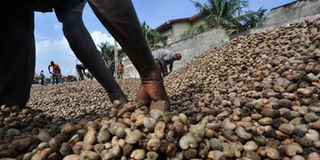Cashews boss fired as price row bites

What you need to know:
- New twist in cashew nut pricing saga as government removes cashew nut board director general and orders suspension of auction of the produce as a clear answer is sought over farmers’ frustrations.
Lindi/Dar. The cashew nuts row snowballed yesterday after the government removed the Cashewnut Board of Tanzania director general, Prof Wakuru Magigi, over failure to supervise the produce trading.
The controversy started with a farmers’ boycott of the sale of the crop in three consecutive auctions due to low pricing.
The government also suspended the cashew nut auction until next week on Tuesday, as it sought a solution to the pricing stalemate.
Prime Minister Kassim Majaliwa revealed yesterday at a meeting with stakeholders in Lindi that President John Magufuli ordered the removal of Prof Magigi.
It was during the same meeting that he said auctions would remain suspended until a proper decision on pricing is arrived at by the government.
Mr Majaliwa flew to Lindi in the morning to address the unfolding crisis. It was the first time that the government was intervening directly to forestall a backlash over the manner in which it handled the sector during the last budget session in June, when a vote was passed to deny the farmers over Sh200 billion in cashew nut development levy. A statement from the PM’s office said President Magufuli was dissatisfied with the manner in which the Ministry of Agriculture and CBT had mishandled the marketing of farmers’ produce, leading to the disruption.
Prof Magigi who was named to the position in May this year was ordered back to the ministry headquarters. His fate appeared sealed when Mtwara Regional Commissioner Gelasius Byakanwa and his Lindi counterpart Godfrey Zambi complained he had disregarded their advice.
“He was accused of carrying an illegal operation by armed people against officials of cashew nut cooperatives.” Mr Majaliwa ordered that the vehicle that was used in the operation be impounded as well as those involved arrested.
This was after cooperative officials protested two of their colleagues Sahaibu Hamis and Sadick Kazumari were abducted on Wednesday and held for hours before being dumped at night by individuals who posed as “state agents.”
It is not yet clear what the government wanted to do over the prices but Mr Majaliwa said Dr Magufuli was in agreement with farmers for boycotting the lower prices.
Farmers have boycotted at least three auctions so far. The farmers enjoyed record prices of up to Sh4,000 a kilo, but buyers are offering Sh2,700 this season.
The new buying season started early this month but no trading has taken place due to the boycott, leading to fear that the disruption would affect the country’s forex earnings.
Opposition leader Zitto Kabwe yesterday said the government was to blame over the controversy and said those who ignored MPs advise in June should take responsibility.
He said the decision to scrap the cashew nut development levy and failure to provide for funds for price stabilization as advised will have a far reaching effect on the performance of the cashew nut sector this season. “There are clear signs already that production will plummet by 40 per cent this season while the government may not match the promise to offer farmers Sh5000 a kilo,’ said Mr Kabwe who is Kigoma Urban MP and leader of ACT-Wazalendo party.
The cashew nut price crisis has however an international dimension, with prices in the global market falling while leading producers such as Ivory Coast have 150,000 tonnes of the crop unsold.
For Tanzania, the crisis has been compounded by among other factors, failure of foreign companies, especially from Vietnam taking part in the auctions. Last season these foreign firms were instrumental in raising prices. Reports say there were currently about 30 bidding firms from 60 which participated last season.
Already deputy minister for Agriculture, Mr Omary Mgumba early in the week said the government would engage Tanzania ambassadors in Vietnam and India to survey the markets in those countries so that findings can help determine the way forward locally.




